Impact of Globalization on Sustainability
VerifiedAdded on 2023/03/31
|15
|3551
|217
AI Summary
This paper discusses the positive and negative impact of globalization on sustainability and its relation to economic growth. It explores the implications for future managers in a globalized world.
Contribute Materials
Your contribution can guide someone’s learning journey. Share your
documents today.
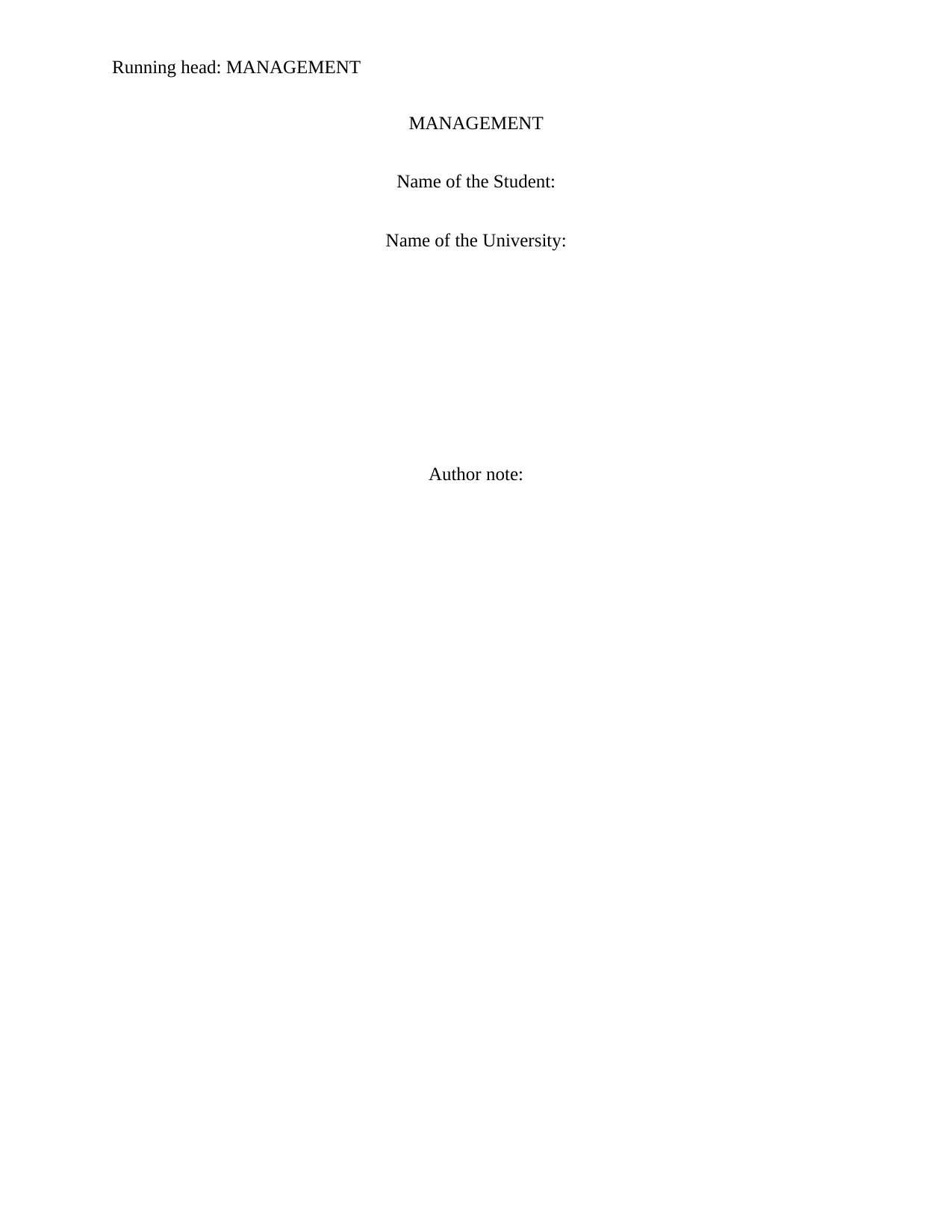
Running head: MANAGEMENT
MANAGEMENT
Name of the Student:
Name of the University:
Author note:
MANAGEMENT
Name of the Student:
Name of the University:
Author note:
Secure Best Marks with AI Grader
Need help grading? Try our AI Grader for instant feedback on your assignments.
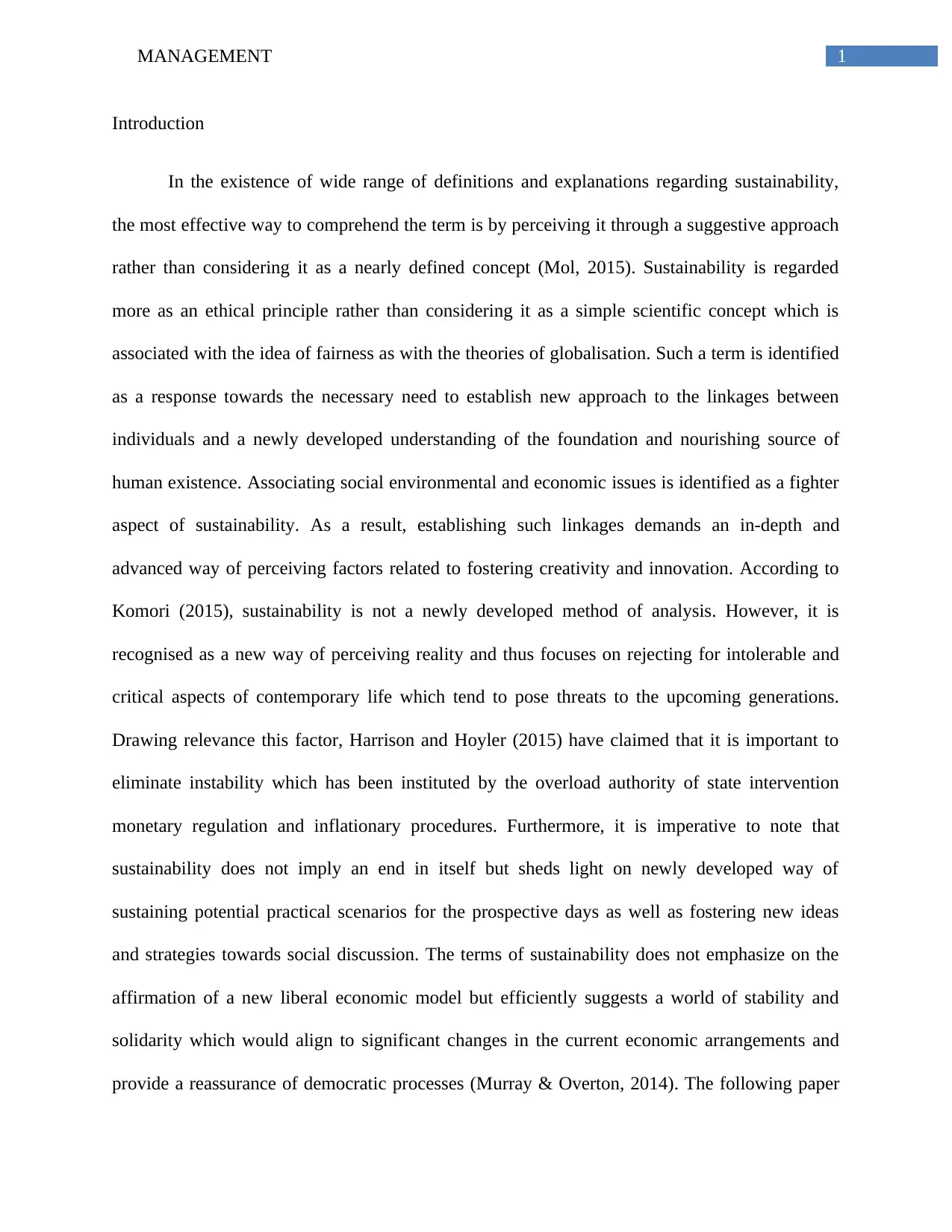
1MANAGEMENT
Introduction
In the existence of wide range of definitions and explanations regarding sustainability,
the most effective way to comprehend the term is by perceiving it through a suggestive approach
rather than considering it as a nearly defined concept (Mol, 2015). Sustainability is regarded
more as an ethical principle rather than considering it as a simple scientific concept which is
associated with the idea of fairness as with the theories of globalisation. Such a term is identified
as a response towards the necessary need to establish new approach to the linkages between
individuals and a newly developed understanding of the foundation and nourishing source of
human existence. Associating social environmental and economic issues is identified as a fighter
aspect of sustainability. As a result, establishing such linkages demands an in-depth and
advanced way of perceiving factors related to fostering creativity and innovation. According to
Komori (2015), sustainability is not a newly developed method of analysis. However, it is
recognised as a new way of perceiving reality and thus focuses on rejecting for intolerable and
critical aspects of contemporary life which tend to pose threats to the upcoming generations.
Drawing relevance this factor, Harrison and Hoyler (2015) have claimed that it is important to
eliminate instability which has been instituted by the overload authority of state intervention
monetary regulation and inflationary procedures. Furthermore, it is imperative to note that
sustainability does not imply an end in itself but sheds light on newly developed way of
sustaining potential practical scenarios for the prospective days as well as fostering new ideas
and strategies towards social discussion. The terms of sustainability does not emphasize on the
affirmation of a new liberal economic model but efficiently suggests a world of stability and
solidarity which would align to significant changes in the current economic arrangements and
provide a reassurance of democratic processes (Murray & Overton, 2014). The following paper
Introduction
In the existence of wide range of definitions and explanations regarding sustainability,
the most effective way to comprehend the term is by perceiving it through a suggestive approach
rather than considering it as a nearly defined concept (Mol, 2015). Sustainability is regarded
more as an ethical principle rather than considering it as a simple scientific concept which is
associated with the idea of fairness as with the theories of globalisation. Such a term is identified
as a response towards the necessary need to establish new approach to the linkages between
individuals and a newly developed understanding of the foundation and nourishing source of
human existence. Associating social environmental and economic issues is identified as a fighter
aspect of sustainability. As a result, establishing such linkages demands an in-depth and
advanced way of perceiving factors related to fostering creativity and innovation. According to
Komori (2015), sustainability is not a newly developed method of analysis. However, it is
recognised as a new way of perceiving reality and thus focuses on rejecting for intolerable and
critical aspects of contemporary life which tend to pose threats to the upcoming generations.
Drawing relevance this factor, Harrison and Hoyler (2015) have claimed that it is important to
eliminate instability which has been instituted by the overload authority of state intervention
monetary regulation and inflationary procedures. Furthermore, it is imperative to note that
sustainability does not imply an end in itself but sheds light on newly developed way of
sustaining potential practical scenarios for the prospective days as well as fostering new ideas
and strategies towards social discussion. The terms of sustainability does not emphasize on the
affirmation of a new liberal economic model but efficiently suggests a world of stability and
solidarity which would align to significant changes in the current economic arrangements and
provide a reassurance of democratic processes (Murray & Overton, 2014). The following paper
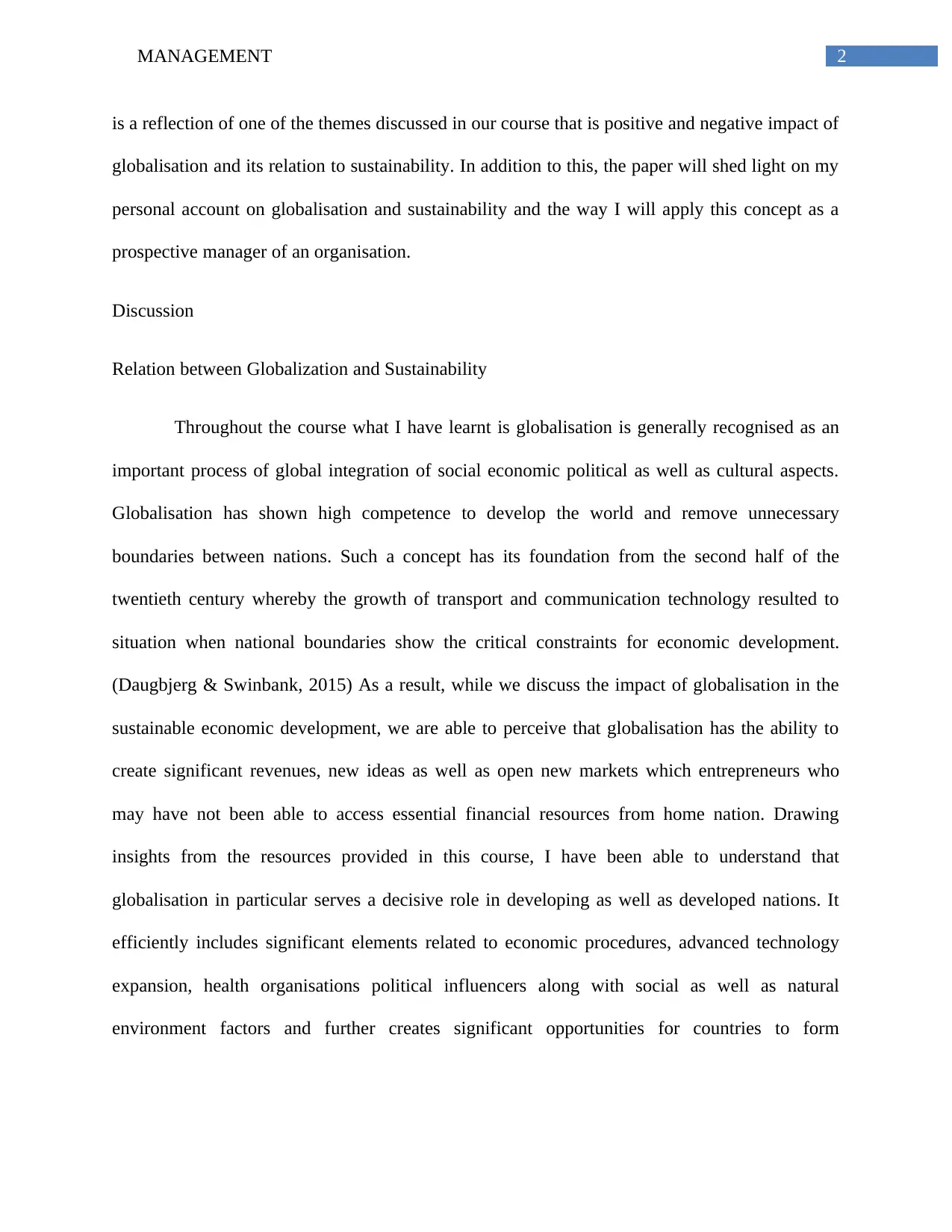
2MANAGEMENT
is a reflection of one of the themes discussed in our course that is positive and negative impact of
globalisation and its relation to sustainability. In addition to this, the paper will shed light on my
personal account on globalisation and sustainability and the way I will apply this concept as a
prospective manager of an organisation.
Discussion
Relation between Globalization and Sustainability
Throughout the course what I have learnt is globalisation is generally recognised as an
important process of global integration of social economic political as well as cultural aspects.
Globalisation has shown high competence to develop the world and remove unnecessary
boundaries between nations. Such a concept has its foundation from the second half of the
twentieth century whereby the growth of transport and communication technology resulted to
situation when national boundaries show the critical constraints for economic development.
(Daugbjerg & Swinbank, 2015) As a result, while we discuss the impact of globalisation in the
sustainable economic development, we are able to perceive that globalisation has the ability to
create significant revenues, new ideas as well as open new markets which entrepreneurs who
may have not been able to access essential financial resources from home nation. Drawing
insights from the resources provided in this course, I have been able to understand that
globalisation in particular serves a decisive role in developing as well as developed nations. It
efficiently includes significant elements related to economic procedures, advanced technology
expansion, health organisations political influencers along with social as well as natural
environment factors and further creates significant opportunities for countries to form
is a reflection of one of the themes discussed in our course that is positive and negative impact of
globalisation and its relation to sustainability. In addition to this, the paper will shed light on my
personal account on globalisation and sustainability and the way I will apply this concept as a
prospective manager of an organisation.
Discussion
Relation between Globalization and Sustainability
Throughout the course what I have learnt is globalisation is generally recognised as an
important process of global integration of social economic political as well as cultural aspects.
Globalisation has shown high competence to develop the world and remove unnecessary
boundaries between nations. Such a concept has its foundation from the second half of the
twentieth century whereby the growth of transport and communication technology resulted to
situation when national boundaries show the critical constraints for economic development.
(Daugbjerg & Swinbank, 2015) As a result, while we discuss the impact of globalisation in the
sustainable economic development, we are able to perceive that globalisation has the ability to
create significant revenues, new ideas as well as open new markets which entrepreneurs who
may have not been able to access essential financial resources from home nation. Drawing
insights from the resources provided in this course, I have been able to understand that
globalisation in particular serves a decisive role in developing as well as developed nations. It
efficiently includes significant elements related to economic procedures, advanced technology
expansion, health organisations political influencers along with social as well as natural
environment factors and further creates significant opportunities for countries to form
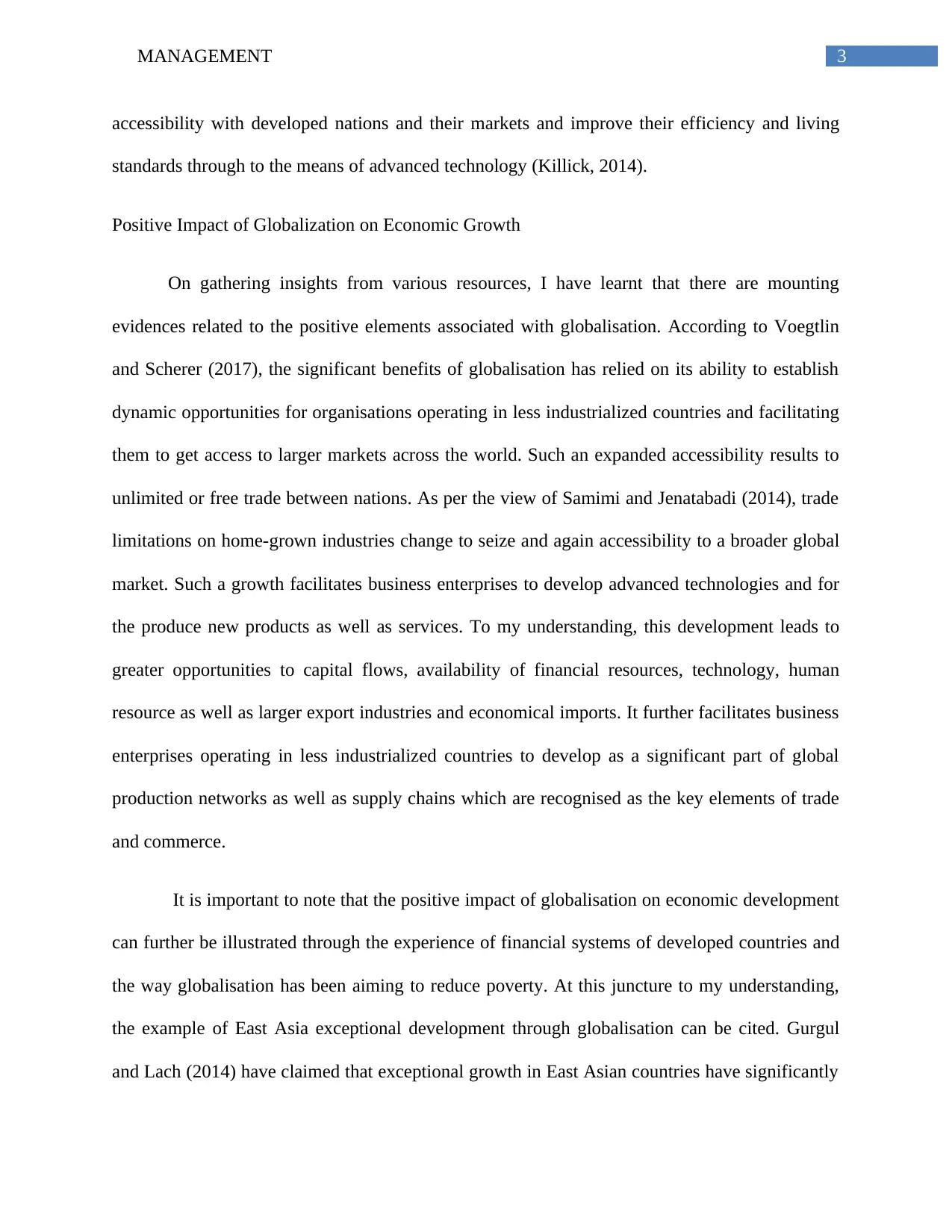
3MANAGEMENT
accessibility with developed nations and their markets and improve their efficiency and living
standards through to the means of advanced technology (Killick, 2014).
Positive Impact of Globalization on Economic Growth
On gathering insights from various resources, I have learnt that there are mounting
evidences related to the positive elements associated with globalisation. According to Voegtlin
and Scherer (2017), the significant benefits of globalisation has relied on its ability to establish
dynamic opportunities for organisations operating in less industrialized countries and facilitating
them to get access to larger markets across the world. Such an expanded accessibility results to
unlimited or free trade between nations. As per the view of Samimi and Jenatabadi (2014), trade
limitations on home-grown industries change to seize and again accessibility to a broader global
market. Such a growth facilitates business enterprises to develop advanced technologies and for
the produce new products as well as services. To my understanding, this development leads to
greater opportunities to capital flows, availability of financial resources, technology, human
resource as well as larger export industries and economical imports. It further facilitates business
enterprises operating in less industrialized countries to develop as a significant part of global
production networks as well as supply chains which are recognised as the key elements of trade
and commerce.
It is important to note that the positive impact of globalisation on economic development
can further be illustrated through the experience of financial systems of developed countries and
the way globalisation has been aiming to reduce poverty. At this juncture to my understanding,
the example of East Asia exceptional development through globalisation can be cited. Gurgul
and Lach (2014) have claimed that exceptional growth in East Asian countries have significantly
accessibility with developed nations and their markets and improve their efficiency and living
standards through to the means of advanced technology (Killick, 2014).
Positive Impact of Globalization on Economic Growth
On gathering insights from various resources, I have learnt that there are mounting
evidences related to the positive elements associated with globalisation. According to Voegtlin
and Scherer (2017), the significant benefits of globalisation has relied on its ability to establish
dynamic opportunities for organisations operating in less industrialized countries and facilitating
them to get access to larger markets across the world. Such an expanded accessibility results to
unlimited or free trade between nations. As per the view of Samimi and Jenatabadi (2014), trade
limitations on home-grown industries change to seize and again accessibility to a broader global
market. Such a growth facilitates business enterprises to develop advanced technologies and for
the produce new products as well as services. To my understanding, this development leads to
greater opportunities to capital flows, availability of financial resources, technology, human
resource as well as larger export industries and economical imports. It further facilitates business
enterprises operating in less industrialized countries to develop as a significant part of global
production networks as well as supply chains which are recognised as the key elements of trade
and commerce.
It is important to note that the positive impact of globalisation on economic development
can further be illustrated through the experience of financial systems of developed countries and
the way globalisation has been aiming to reduce poverty. At this juncture to my understanding,
the example of East Asia exceptional development through globalisation can be cited. Gurgul
and Lach (2014) have claimed that exceptional growth in East Asian countries have significantly
Secure Best Marks with AI Grader
Need help grading? Try our AI Grader for instant feedback on your assignments.
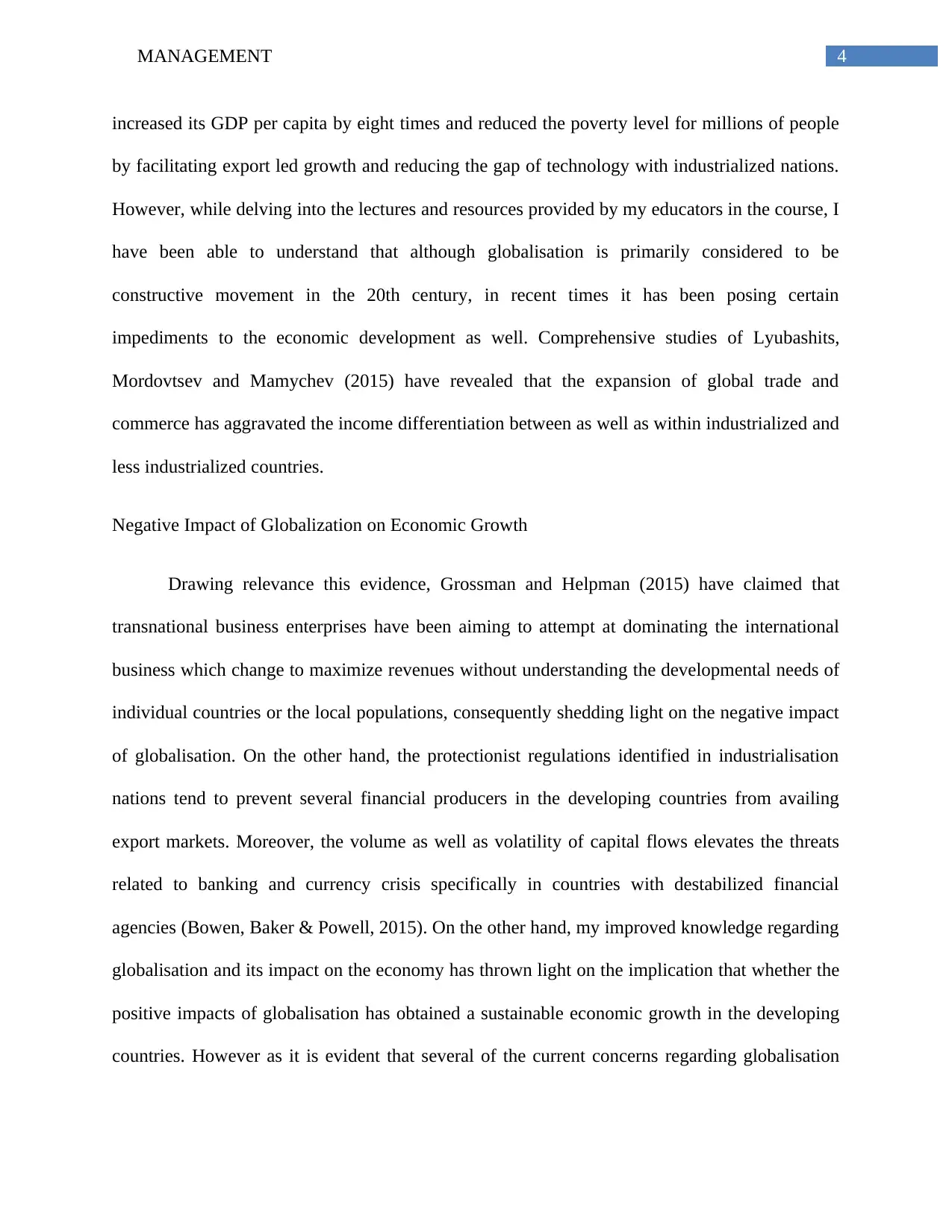
4MANAGEMENT
increased its GDP per capita by eight times and reduced the poverty level for millions of people
by facilitating export led growth and reducing the gap of technology with industrialized nations.
However, while delving into the lectures and resources provided by my educators in the course, I
have been able to understand that although globalisation is primarily considered to be
constructive movement in the 20th century, in recent times it has been posing certain
impediments to the economic development as well. Comprehensive studies of Lyubashits,
Mordovtsev and Mamychev (2015) have revealed that the expansion of global trade and
commerce has aggravated the income differentiation between as well as within industrialized and
less industrialized countries.
Negative Impact of Globalization on Economic Growth
Drawing relevance this evidence, Grossman and Helpman (2015) have claimed that
transnational business enterprises have been aiming to attempt at dominating the international
business which change to maximize revenues without understanding the developmental needs of
individual countries or the local populations, consequently shedding light on the negative impact
of globalisation. On the other hand, the protectionist regulations identified in industrialisation
nations tend to prevent several financial producers in the developing countries from availing
export markets. Moreover, the volume as well as volatility of capital flows elevates the threats
related to banking and currency crisis specifically in countries with destabilized financial
agencies (Bowen, Baker & Powell, 2015). On the other hand, my improved knowledge regarding
globalisation and its impact on the economy has thrown light on the implication that whether the
positive impacts of globalisation has obtained a sustainable economic growth in the developing
countries. However as it is evident that several of the current concerns regarding globalisation
increased its GDP per capita by eight times and reduced the poverty level for millions of people
by facilitating export led growth and reducing the gap of technology with industrialized nations.
However, while delving into the lectures and resources provided by my educators in the course, I
have been able to understand that although globalisation is primarily considered to be
constructive movement in the 20th century, in recent times it has been posing certain
impediments to the economic development as well. Comprehensive studies of Lyubashits,
Mordovtsev and Mamychev (2015) have revealed that the expansion of global trade and
commerce has aggravated the income differentiation between as well as within industrialized and
less industrialized countries.
Negative Impact of Globalization on Economic Growth
Drawing relevance this evidence, Grossman and Helpman (2015) have claimed that
transnational business enterprises have been aiming to attempt at dominating the international
business which change to maximize revenues without understanding the developmental needs of
individual countries or the local populations, consequently shedding light on the negative impact
of globalisation. On the other hand, the protectionist regulations identified in industrialisation
nations tend to prevent several financial producers in the developing countries from availing
export markets. Moreover, the volume as well as volatility of capital flows elevates the threats
related to banking and currency crisis specifically in countries with destabilized financial
agencies (Bowen, Baker & Powell, 2015). On the other hand, my improved knowledge regarding
globalisation and its impact on the economy has thrown light on the implication that whether the
positive impacts of globalisation has obtained a sustainable economic growth in the developing
countries. However as it is evident that several of the current concerns regarding globalisation
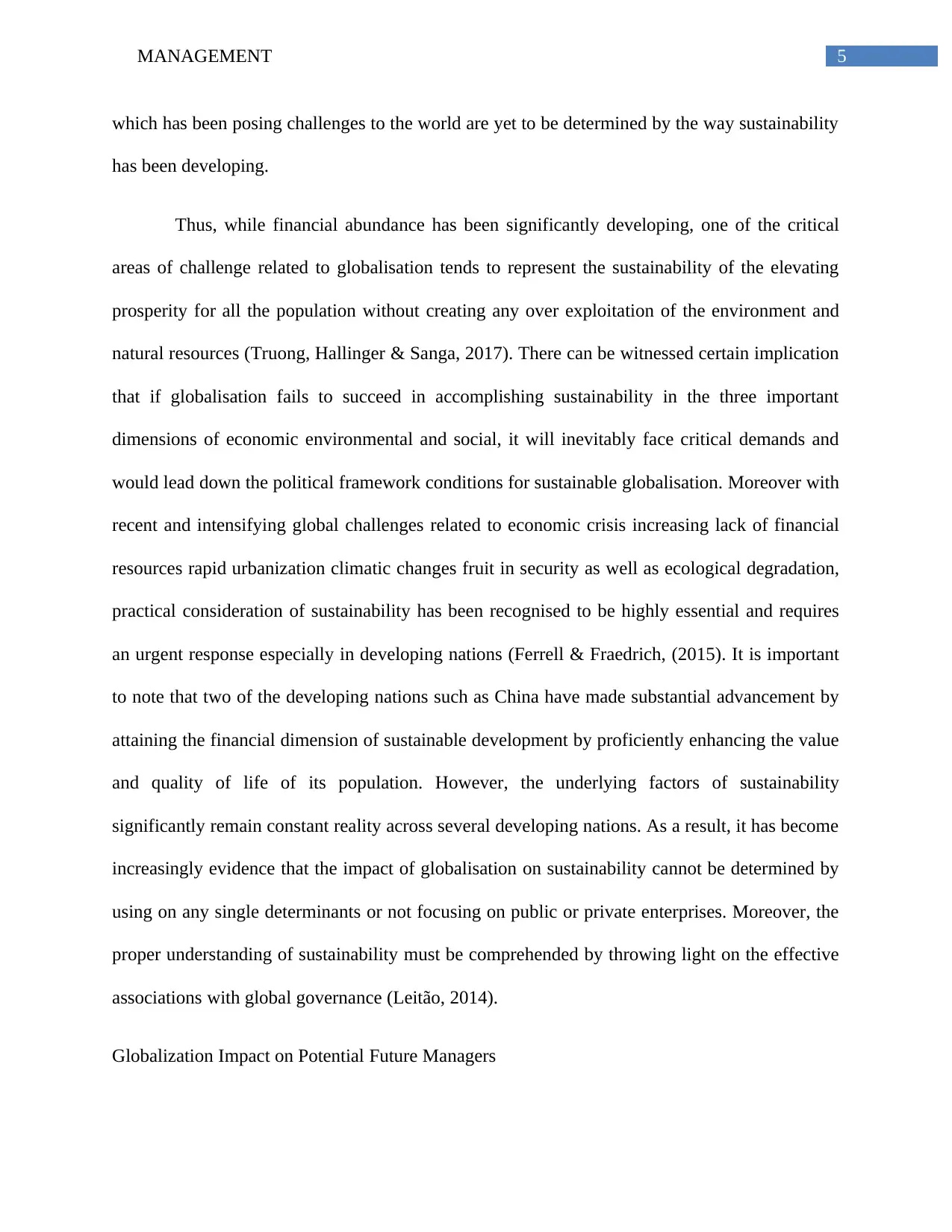
5MANAGEMENT
which has been posing challenges to the world are yet to be determined by the way sustainability
has been developing.
Thus, while financial abundance has been significantly developing, one of the critical
areas of challenge related to globalisation tends to represent the sustainability of the elevating
prosperity for all the population without creating any over exploitation of the environment and
natural resources (Truong, Hallinger & Sanga, 2017). There can be witnessed certain implication
that if globalisation fails to succeed in accomplishing sustainability in the three important
dimensions of economic environmental and social, it will inevitably face critical demands and
would lead down the political framework conditions for sustainable globalisation. Moreover with
recent and intensifying global challenges related to economic crisis increasing lack of financial
resources rapid urbanization climatic changes fruit in security as well as ecological degradation,
practical consideration of sustainability has been recognised to be highly essential and requires
an urgent response especially in developing nations (Ferrell & Fraedrich, (2015). It is important
to note that two of the developing nations such as China have made substantial advancement by
attaining the financial dimension of sustainable development by proficiently enhancing the value
and quality of life of its population. However, the underlying factors of sustainability
significantly remain constant reality across several developing nations. As a result, it has become
increasingly evidence that the impact of globalisation on sustainability cannot be determined by
using on any single determinants or not focusing on public or private enterprises. Moreover, the
proper understanding of sustainability must be comprehended by throwing light on the effective
associations with global governance (Leitão, 2014).
Globalization Impact on Potential Future Managers
which has been posing challenges to the world are yet to be determined by the way sustainability
has been developing.
Thus, while financial abundance has been significantly developing, one of the critical
areas of challenge related to globalisation tends to represent the sustainability of the elevating
prosperity for all the population without creating any over exploitation of the environment and
natural resources (Truong, Hallinger & Sanga, 2017). There can be witnessed certain implication
that if globalisation fails to succeed in accomplishing sustainability in the three important
dimensions of economic environmental and social, it will inevitably face critical demands and
would lead down the political framework conditions for sustainable globalisation. Moreover with
recent and intensifying global challenges related to economic crisis increasing lack of financial
resources rapid urbanization climatic changes fruit in security as well as ecological degradation,
practical consideration of sustainability has been recognised to be highly essential and requires
an urgent response especially in developing nations (Ferrell & Fraedrich, (2015). It is important
to note that two of the developing nations such as China have made substantial advancement by
attaining the financial dimension of sustainable development by proficiently enhancing the value
and quality of life of its population. However, the underlying factors of sustainability
significantly remain constant reality across several developing nations. As a result, it has become
increasingly evidence that the impact of globalisation on sustainability cannot be determined by
using on any single determinants or not focusing on public or private enterprises. Moreover, the
proper understanding of sustainability must be comprehended by throwing light on the effective
associations with global governance (Leitão, 2014).
Globalization Impact on Potential Future Managers
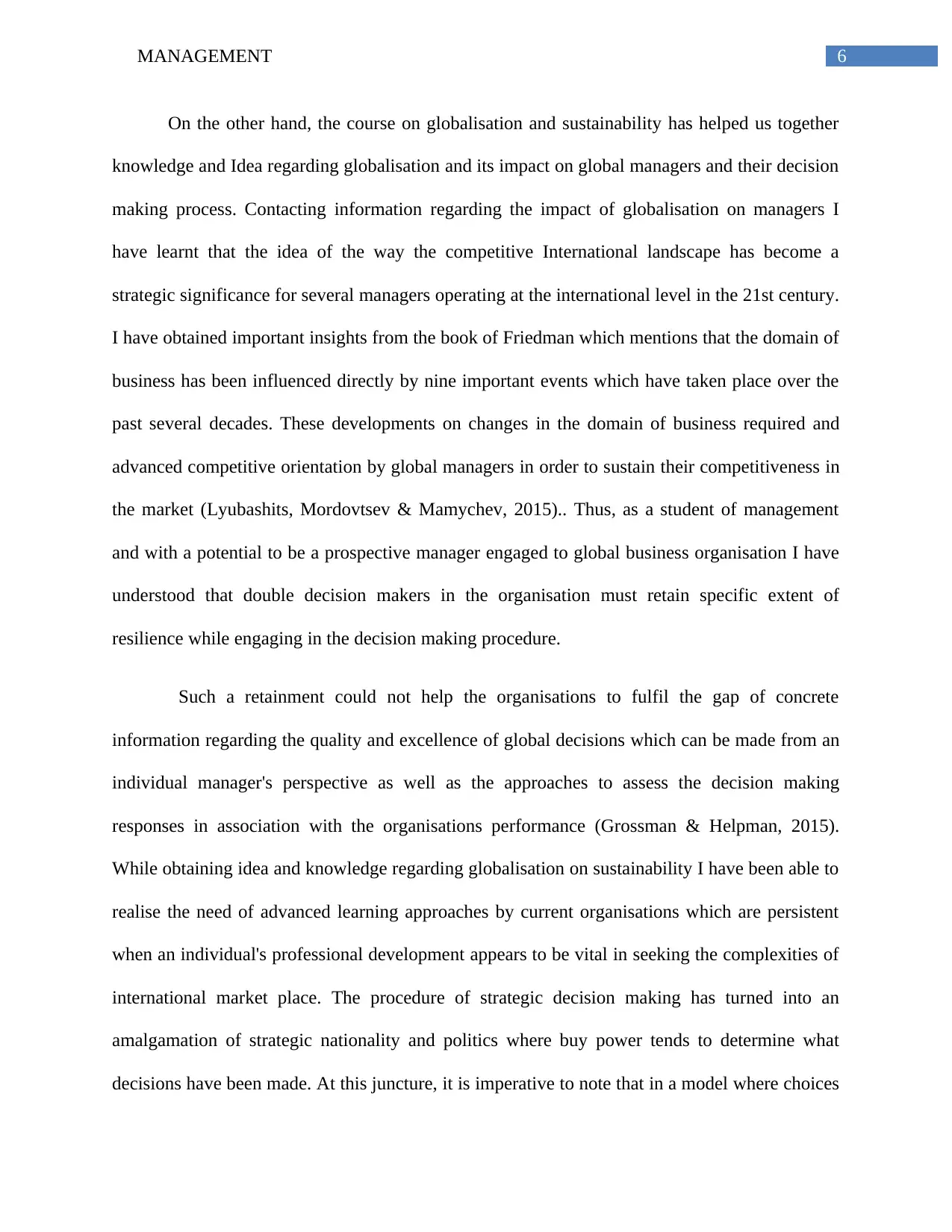
6MANAGEMENT
On the other hand, the course on globalisation and sustainability has helped us together
knowledge and Idea regarding globalisation and its impact on global managers and their decision
making process. Contacting information regarding the impact of globalisation on managers I
have learnt that the idea of the way the competitive International landscape has become a
strategic significance for several managers operating at the international level in the 21st century.
I have obtained important insights from the book of Friedman which mentions that the domain of
business has been influenced directly by nine important events which have taken place over the
past several decades. These developments on changes in the domain of business required and
advanced competitive orientation by global managers in order to sustain their competitiveness in
the market (Lyubashits, Mordovtsev & Mamychev, 2015).. Thus, as a student of management
and with a potential to be a prospective manager engaged to global business organisation I have
understood that double decision makers in the organisation must retain specific extent of
resilience while engaging in the decision making procedure.
Such a retainment could not help the organisations to fulfil the gap of concrete
information regarding the quality and excellence of global decisions which can be made from an
individual manager's perspective as well as the approaches to assess the decision making
responses in association with the organisations performance (Grossman & Helpman, 2015).
While obtaining idea and knowledge regarding globalisation on sustainability I have been able to
realise the need of advanced learning approaches by current organisations which are persistent
when an individual's professional development appears to be vital in seeking the complexities of
international market place. The procedure of strategic decision making has turned into an
amalgamation of strategic nationality and politics where buy power tends to determine what
decisions have been made. At this juncture, it is imperative to note that in a model where choices
On the other hand, the course on globalisation and sustainability has helped us together
knowledge and Idea regarding globalisation and its impact on global managers and their decision
making process. Contacting information regarding the impact of globalisation on managers I
have learnt that the idea of the way the competitive International landscape has become a
strategic significance for several managers operating at the international level in the 21st century.
I have obtained important insights from the book of Friedman which mentions that the domain of
business has been influenced directly by nine important events which have taken place over the
past several decades. These developments on changes in the domain of business required and
advanced competitive orientation by global managers in order to sustain their competitiveness in
the market (Lyubashits, Mordovtsev & Mamychev, 2015).. Thus, as a student of management
and with a potential to be a prospective manager engaged to global business organisation I have
understood that double decision makers in the organisation must retain specific extent of
resilience while engaging in the decision making procedure.
Such a retainment could not help the organisations to fulfil the gap of concrete
information regarding the quality and excellence of global decisions which can be made from an
individual manager's perspective as well as the approaches to assess the decision making
responses in association with the organisations performance (Grossman & Helpman, 2015).
While obtaining idea and knowledge regarding globalisation on sustainability I have been able to
realise the need of advanced learning approaches by current organisations which are persistent
when an individual's professional development appears to be vital in seeking the complexities of
international market place. The procedure of strategic decision making has turned into an
amalgamation of strategic nationality and politics where buy power tends to determine what
decisions have been made. At this juncture, it is imperative to note that in a model where choices
Paraphrase This Document
Need a fresh take? Get an instant paraphrase of this document with our AI Paraphraser
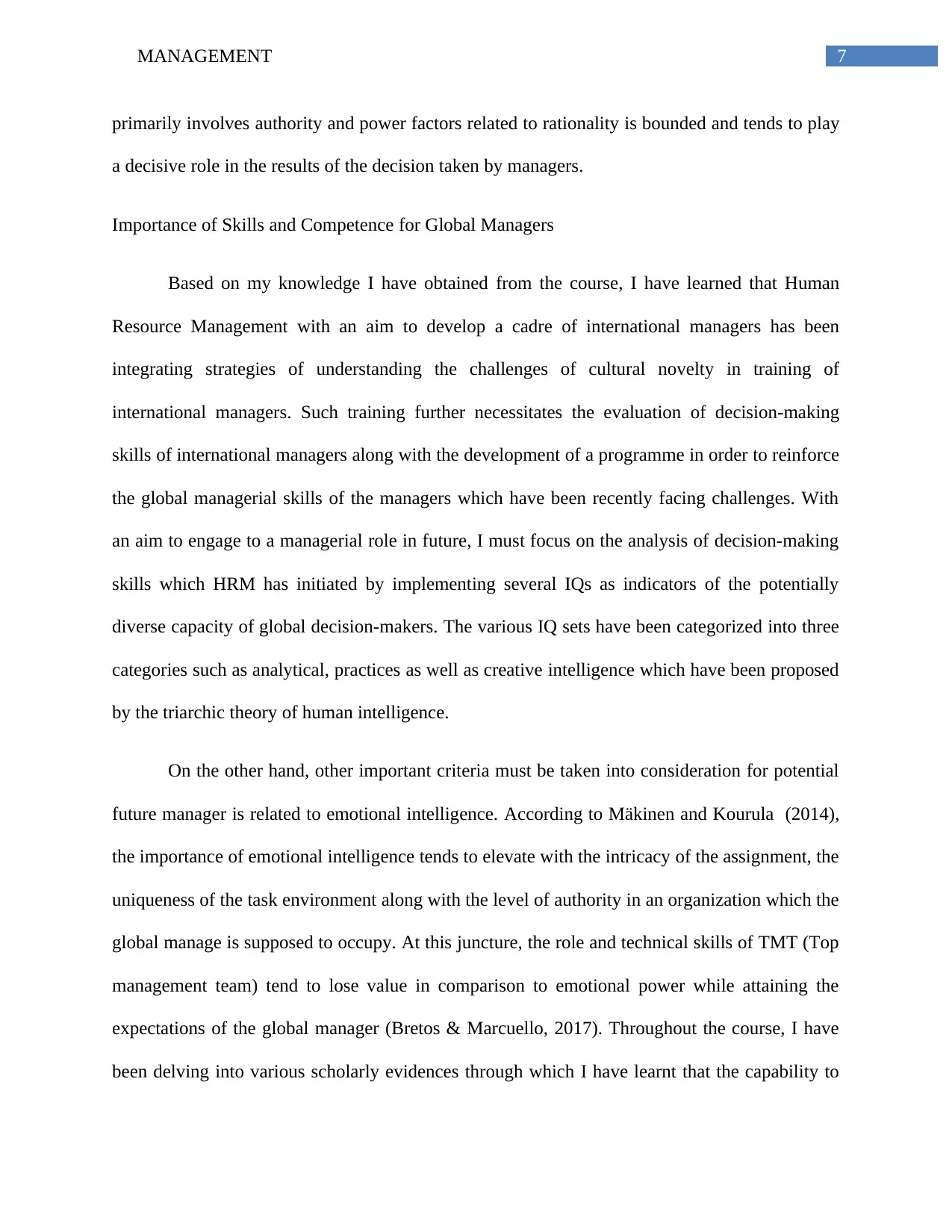
7MANAGEMENT
primarily involves authority and power factors related to rationality is bounded and tends to play
a decisive role in the results of the decision taken by managers.
Importance of Skills and Competence for Global Managers
Based on my knowledge I have obtained from the course, I have learned that Human
Resource Management with an aim to develop a cadre of international managers has been
integrating strategies of understanding the challenges of cultural novelty in training of
international managers. Such training further necessitates the evaluation of decision-making
skills of international managers along with the development of a programme in order to reinforce
the global managerial skills of the managers which have been recently facing challenges. With
an aim to engage to a managerial role in future, I must focus on the analysis of decision-making
skills which HRM has initiated by implementing several IQs as indicators of the potentially
diverse capacity of global decision-makers. The various IQ sets have been categorized into three
categories such as analytical, practices as well as creative intelligence which have been proposed
by the triarchic theory of human intelligence.
On the other hand, other important criteria must be taken into consideration for potential
future manager is related to emotional intelligence. According to Mäkinen and Kourula (2014),
the importance of emotional intelligence tends to elevate with the intricacy of the assignment, the
uniqueness of the task environment along with the level of authority in an organization which the
global manage is supposed to occupy. At this juncture, the role and technical skills of TMT (Top
management team) tend to lose value in comparison to emotional power while attaining the
expectations of the global manager (Bretos & Marcuello, 2017). Throughout the course, I have
been delving into various scholarly evidences through which I have learnt that the capability to
primarily involves authority and power factors related to rationality is bounded and tends to play
a decisive role in the results of the decision taken by managers.
Importance of Skills and Competence for Global Managers
Based on my knowledge I have obtained from the course, I have learned that Human
Resource Management with an aim to develop a cadre of international managers has been
integrating strategies of understanding the challenges of cultural novelty in training of
international managers. Such training further necessitates the evaluation of decision-making
skills of international managers along with the development of a programme in order to reinforce
the global managerial skills of the managers which have been recently facing challenges. With
an aim to engage to a managerial role in future, I must focus on the analysis of decision-making
skills which HRM has initiated by implementing several IQs as indicators of the potentially
diverse capacity of global decision-makers. The various IQ sets have been categorized into three
categories such as analytical, practices as well as creative intelligence which have been proposed
by the triarchic theory of human intelligence.
On the other hand, other important criteria must be taken into consideration for potential
future manager is related to emotional intelligence. According to Mäkinen and Kourula (2014),
the importance of emotional intelligence tends to elevate with the intricacy of the assignment, the
uniqueness of the task environment along with the level of authority in an organization which the
global manage is supposed to occupy. At this juncture, the role and technical skills of TMT (Top
management team) tend to lose value in comparison to emotional power while attaining the
expectations of the global manager (Bretos & Marcuello, 2017). Throughout the course, I have
been delving into various scholarly evidences through which I have learnt that the capability to
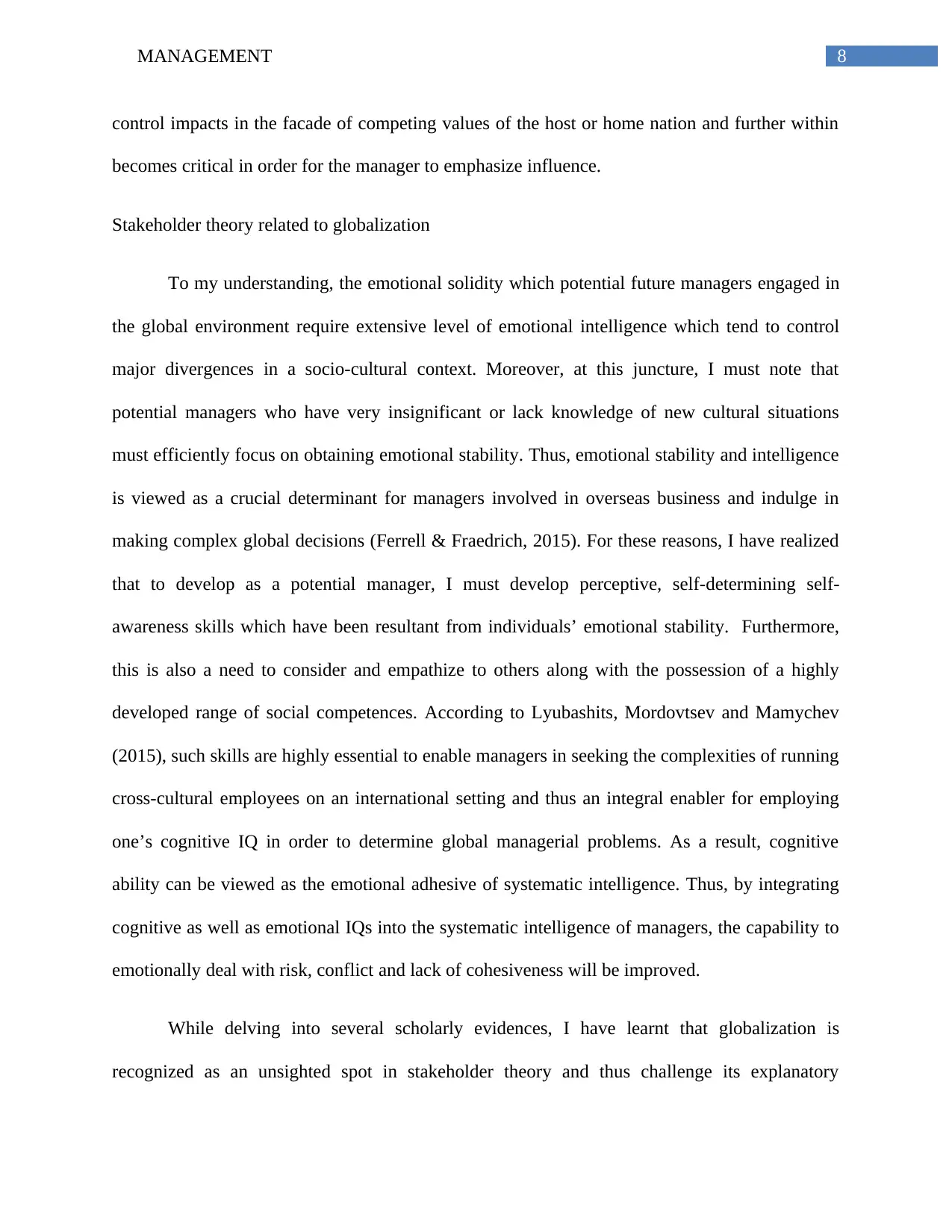
8MANAGEMENT
control impacts in the facade of competing values of the host or home nation and further within
becomes critical in order for the manager to emphasize influence.
Stakeholder theory related to globalization
To my understanding, the emotional solidity which potential future managers engaged in
the global environment require extensive level of emotional intelligence which tend to control
major divergences in a socio-cultural context. Moreover, at this juncture, I must note that
potential managers who have very insignificant or lack knowledge of new cultural situations
must efficiently focus on obtaining emotional stability. Thus, emotional stability and intelligence
is viewed as a crucial determinant for managers involved in overseas business and indulge in
making complex global decisions (Ferrell & Fraedrich, 2015). For these reasons, I have realized
that to develop as a potential manager, I must develop perceptive, self-determining self-
awareness skills which have been resultant from individuals’ emotional stability. Furthermore,
this is also a need to consider and empathize to others along with the possession of a highly
developed range of social competences. According to Lyubashits, Mordovtsev and Mamychev
(2015), such skills are highly essential to enable managers in seeking the complexities of running
cross-cultural employees on an international setting and thus an integral enabler for employing
one’s cognitive IQ in order to determine global managerial problems. As a result, cognitive
ability can be viewed as the emotional adhesive of systematic intelligence. Thus, by integrating
cognitive as well as emotional IQs into the systematic intelligence of managers, the capability to
emotionally deal with risk, conflict and lack of cohesiveness will be improved.
While delving into several scholarly evidences, I have learnt that globalization is
recognized as an unsighted spot in stakeholder theory and thus challenge its explanatory
control impacts in the facade of competing values of the host or home nation and further within
becomes critical in order for the manager to emphasize influence.
Stakeholder theory related to globalization
To my understanding, the emotional solidity which potential future managers engaged in
the global environment require extensive level of emotional intelligence which tend to control
major divergences in a socio-cultural context. Moreover, at this juncture, I must note that
potential managers who have very insignificant or lack knowledge of new cultural situations
must efficiently focus on obtaining emotional stability. Thus, emotional stability and intelligence
is viewed as a crucial determinant for managers involved in overseas business and indulge in
making complex global decisions (Ferrell & Fraedrich, 2015). For these reasons, I have realized
that to develop as a potential manager, I must develop perceptive, self-determining self-
awareness skills which have been resultant from individuals’ emotional stability. Furthermore,
this is also a need to consider and empathize to others along with the possession of a highly
developed range of social competences. According to Lyubashits, Mordovtsev and Mamychev
(2015), such skills are highly essential to enable managers in seeking the complexities of running
cross-cultural employees on an international setting and thus an integral enabler for employing
one’s cognitive IQ in order to determine global managerial problems. As a result, cognitive
ability can be viewed as the emotional adhesive of systematic intelligence. Thus, by integrating
cognitive as well as emotional IQs into the systematic intelligence of managers, the capability to
emotionally deal with risk, conflict and lack of cohesiveness will be improved.
While delving into several scholarly evidences, I have learnt that globalization is
recognized as an unsighted spot in stakeholder theory and thus challenge its explanatory
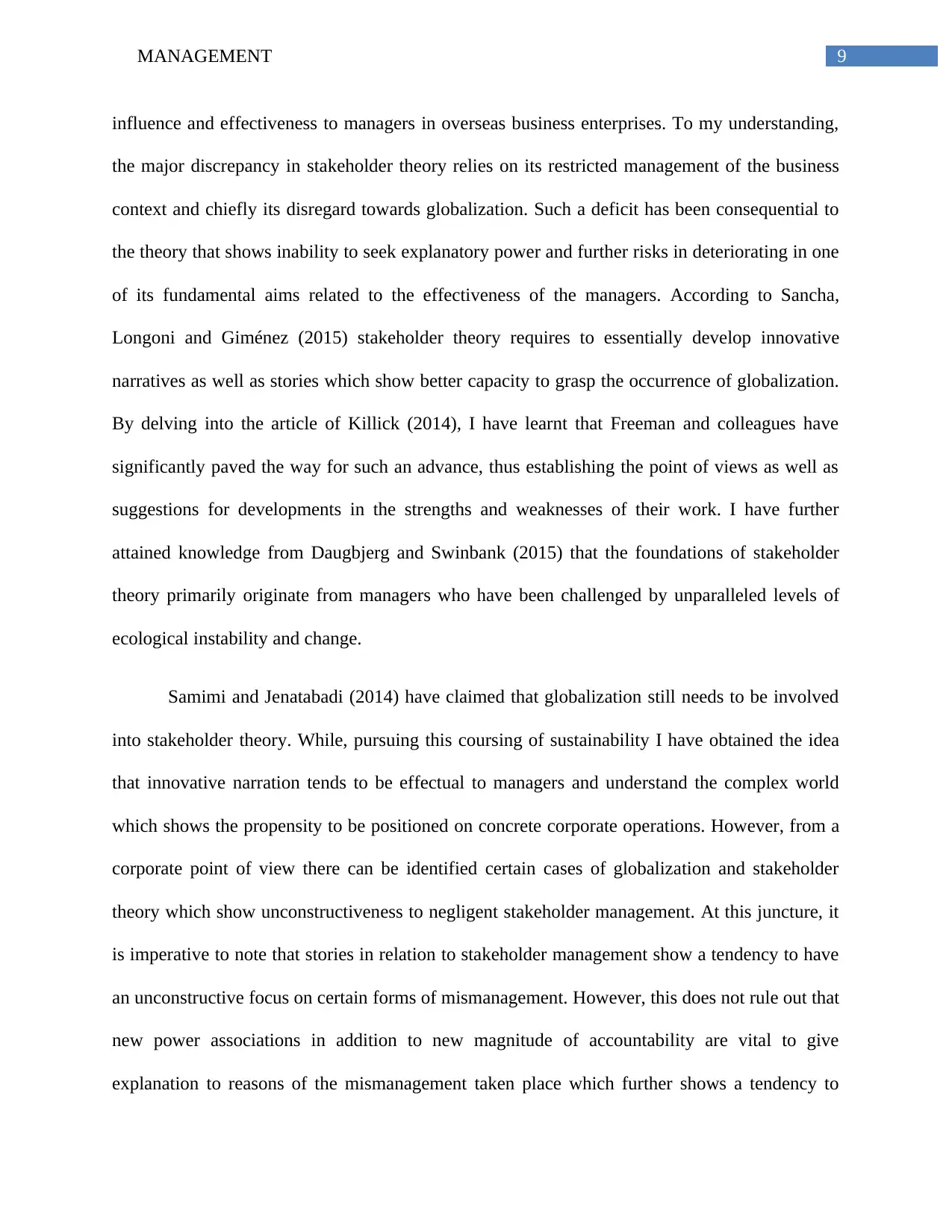
9MANAGEMENT
influence and effectiveness to managers in overseas business enterprises. To my understanding,
the major discrepancy in stakeholder theory relies on its restricted management of the business
context and chiefly its disregard towards globalization. Such a deficit has been consequential to
the theory that shows inability to seek explanatory power and further risks in deteriorating in one
of its fundamental aims related to the effectiveness of the managers. According to Sancha,
Longoni and Giménez (2015) stakeholder theory requires to essentially develop innovative
narratives as well as stories which show better capacity to grasp the occurrence of globalization.
By delving into the article of Killick (2014), I have learnt that Freeman and colleagues have
significantly paved the way for such an advance, thus establishing the point of views as well as
suggestions for developments in the strengths and weaknesses of their work. I have further
attained knowledge from Daugbjerg and Swinbank (2015) that the foundations of stakeholder
theory primarily originate from managers who have been challenged by unparalleled levels of
ecological instability and change.
Samimi and Jenatabadi (2014) have claimed that globalization still needs to be involved
into stakeholder theory. While, pursuing this coursing of sustainability I have obtained the idea
that innovative narration tends to be effectual to managers and understand the complex world
which shows the propensity to be positioned on concrete corporate operations. However, from a
corporate point of view there can be identified certain cases of globalization and stakeholder
theory which show unconstructiveness to negligent stakeholder management. At this juncture, it
is imperative to note that stories in relation to stakeholder management show a tendency to have
an unconstructive focus on certain forms of mismanagement. However, this does not rule out that
new power associations in addition to new magnitude of accountability are vital to give
explanation to reasons of the mismanagement taken place which further shows a tendency to
influence and effectiveness to managers in overseas business enterprises. To my understanding,
the major discrepancy in stakeholder theory relies on its restricted management of the business
context and chiefly its disregard towards globalization. Such a deficit has been consequential to
the theory that shows inability to seek explanatory power and further risks in deteriorating in one
of its fundamental aims related to the effectiveness of the managers. According to Sancha,
Longoni and Giménez (2015) stakeholder theory requires to essentially develop innovative
narratives as well as stories which show better capacity to grasp the occurrence of globalization.
By delving into the article of Killick (2014), I have learnt that Freeman and colleagues have
significantly paved the way for such an advance, thus establishing the point of views as well as
suggestions for developments in the strengths and weaknesses of their work. I have further
attained knowledge from Daugbjerg and Swinbank (2015) that the foundations of stakeholder
theory primarily originate from managers who have been challenged by unparalleled levels of
ecological instability and change.
Samimi and Jenatabadi (2014) have claimed that globalization still needs to be involved
into stakeholder theory. While, pursuing this coursing of sustainability I have obtained the idea
that innovative narration tends to be effectual to managers and understand the complex world
which shows the propensity to be positioned on concrete corporate operations. However, from a
corporate point of view there can be identified certain cases of globalization and stakeholder
theory which show unconstructiveness to negligent stakeholder management. At this juncture, it
is imperative to note that stories in relation to stakeholder management show a tendency to have
an unconstructive focus on certain forms of mismanagement. However, this does not rule out that
new power associations in addition to new magnitude of accountability are vital to give
explanation to reasons of the mismanagement taken place which further shows a tendency to
Secure Best Marks with AI Grader
Need help grading? Try our AI Grader for instant feedback on your assignments.
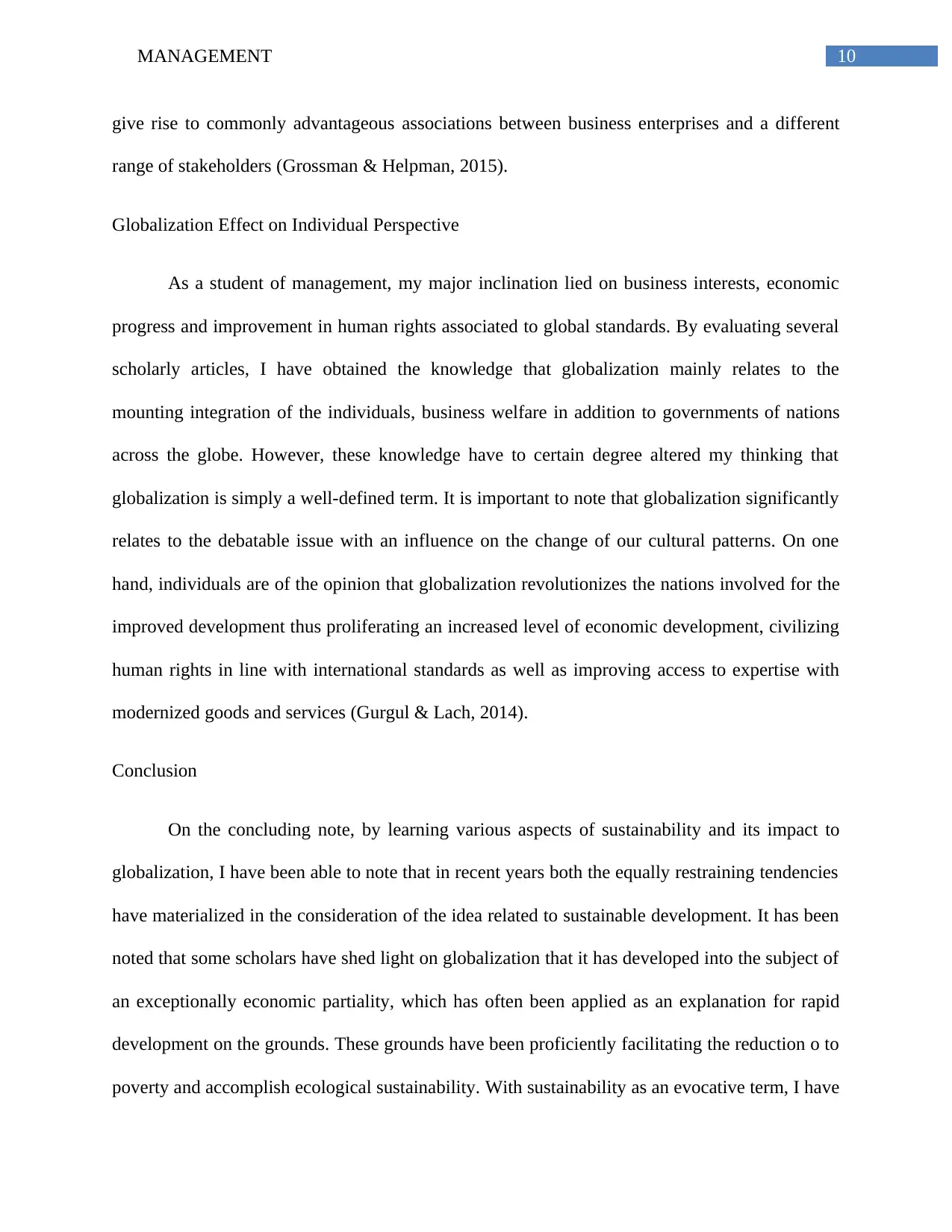
10MANAGEMENT
give rise to commonly advantageous associations between business enterprises and a different
range of stakeholders (Grossman & Helpman, 2015).
Globalization Effect on Individual Perspective
As a student of management, my major inclination lied on business interests, economic
progress and improvement in human rights associated to global standards. By evaluating several
scholarly articles, I have obtained the knowledge that globalization mainly relates to the
mounting integration of the individuals, business welfare in addition to governments of nations
across the globe. However, these knowledge have to certain degree altered my thinking that
globalization is simply a well-defined term. It is important to note that globalization significantly
relates to the debatable issue with an influence on the change of our cultural patterns. On one
hand, individuals are of the opinion that globalization revolutionizes the nations involved for the
improved development thus proliferating an increased level of economic development, civilizing
human rights in line with international standards as well as improving access to expertise with
modernized goods and services (Gurgul & Lach, 2014).
Conclusion
On the concluding note, by learning various aspects of sustainability and its impact to
globalization, I have been able to note that in recent years both the equally restraining tendencies
have materialized in the consideration of the idea related to sustainable development. It has been
noted that some scholars have shed light on globalization that it has developed into the subject of
an exceptionally economic partiality, which has often been applied as an explanation for rapid
development on the grounds. These grounds have been proficiently facilitating the reduction o to
poverty and accomplish ecological sustainability. With sustainability as an evocative term, I have
give rise to commonly advantageous associations between business enterprises and a different
range of stakeholders (Grossman & Helpman, 2015).
Globalization Effect on Individual Perspective
As a student of management, my major inclination lied on business interests, economic
progress and improvement in human rights associated to global standards. By evaluating several
scholarly articles, I have obtained the knowledge that globalization mainly relates to the
mounting integration of the individuals, business welfare in addition to governments of nations
across the globe. However, these knowledge have to certain degree altered my thinking that
globalization is simply a well-defined term. It is important to note that globalization significantly
relates to the debatable issue with an influence on the change of our cultural patterns. On one
hand, individuals are of the opinion that globalization revolutionizes the nations involved for the
improved development thus proliferating an increased level of economic development, civilizing
human rights in line with international standards as well as improving access to expertise with
modernized goods and services (Gurgul & Lach, 2014).
Conclusion
On the concluding note, by learning various aspects of sustainability and its impact to
globalization, I have been able to note that in recent years both the equally restraining tendencies
have materialized in the consideration of the idea related to sustainable development. It has been
noted that some scholars have shed light on globalization that it has developed into the subject of
an exceptionally economic partiality, which has often been applied as an explanation for rapid
development on the grounds. These grounds have been proficiently facilitating the reduction o to
poverty and accomplish ecological sustainability. With sustainability as an evocative term, I have
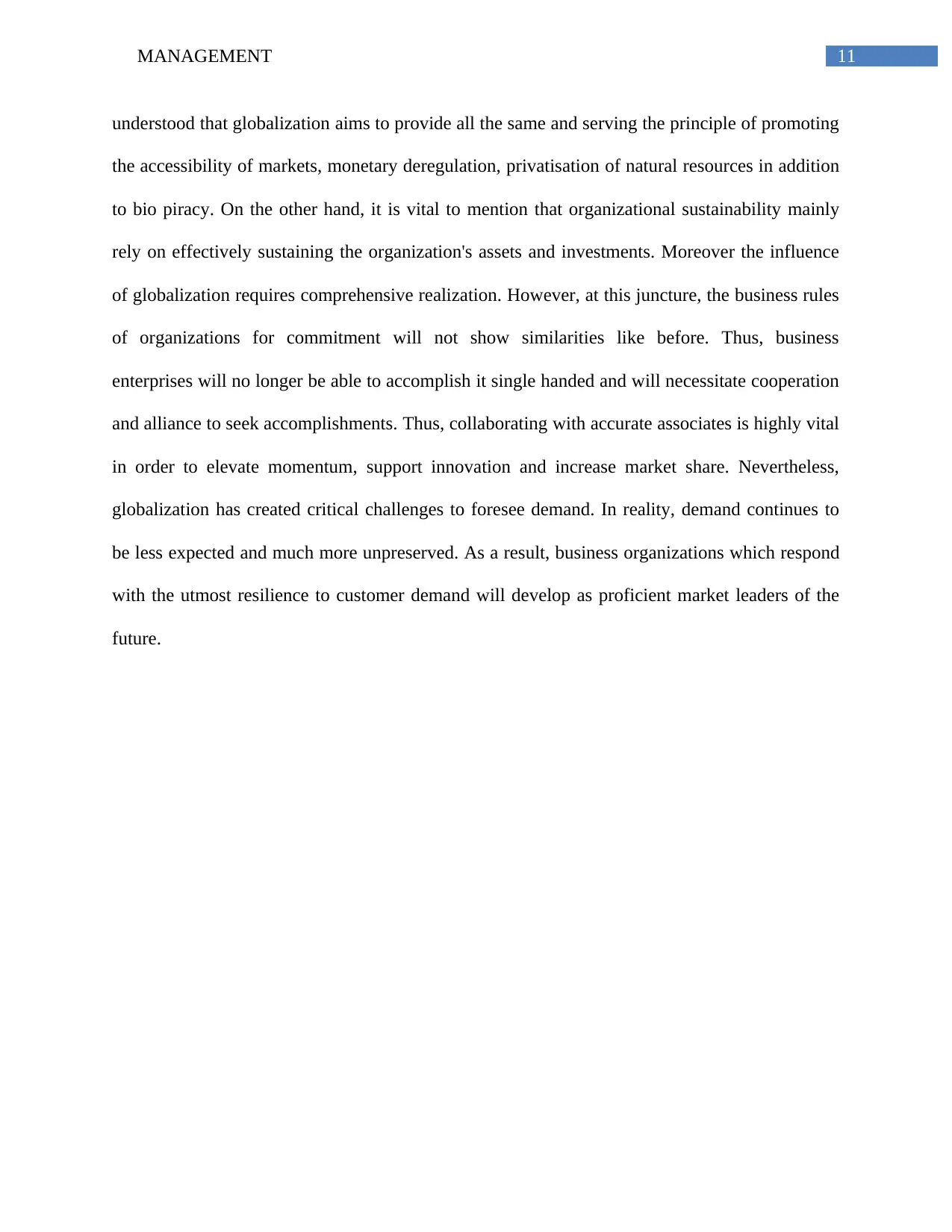
11MANAGEMENT
understood that globalization aims to provide all the same and serving the principle of promoting
the accessibility of markets, monetary deregulation, privatisation of natural resources in addition
to bio piracy. On the other hand, it is vital to mention that organizational sustainability mainly
rely on effectively sustaining the organization's assets and investments. Moreover the influence
of globalization requires comprehensive realization. However, at this juncture, the business rules
of organizations for commitment will not show similarities like before. Thus, business
enterprises will no longer be able to accomplish it single handed and will necessitate cooperation
and alliance to seek accomplishments. Thus, collaborating with accurate associates is highly vital
in order to elevate momentum, support innovation and increase market share. Nevertheless,
globalization has created critical challenges to foresee demand. In reality, demand continues to
be less expected and much more unpreserved. As a result, business organizations which respond
with the utmost resilience to customer demand will develop as proficient market leaders of the
future.
understood that globalization aims to provide all the same and serving the principle of promoting
the accessibility of markets, monetary deregulation, privatisation of natural resources in addition
to bio piracy. On the other hand, it is vital to mention that organizational sustainability mainly
rely on effectively sustaining the organization's assets and investments. Moreover the influence
of globalization requires comprehensive realization. However, at this juncture, the business rules
of organizations for commitment will not show similarities like before. Thus, business
enterprises will no longer be able to accomplish it single handed and will necessitate cooperation
and alliance to seek accomplishments. Thus, collaborating with accurate associates is highly vital
in order to elevate momentum, support innovation and increase market share. Nevertheless,
globalization has created critical challenges to foresee demand. In reality, demand continues to
be less expected and much more unpreserved. As a result, business organizations which respond
with the utmost resilience to customer demand will develop as proficient market leaders of the
future.
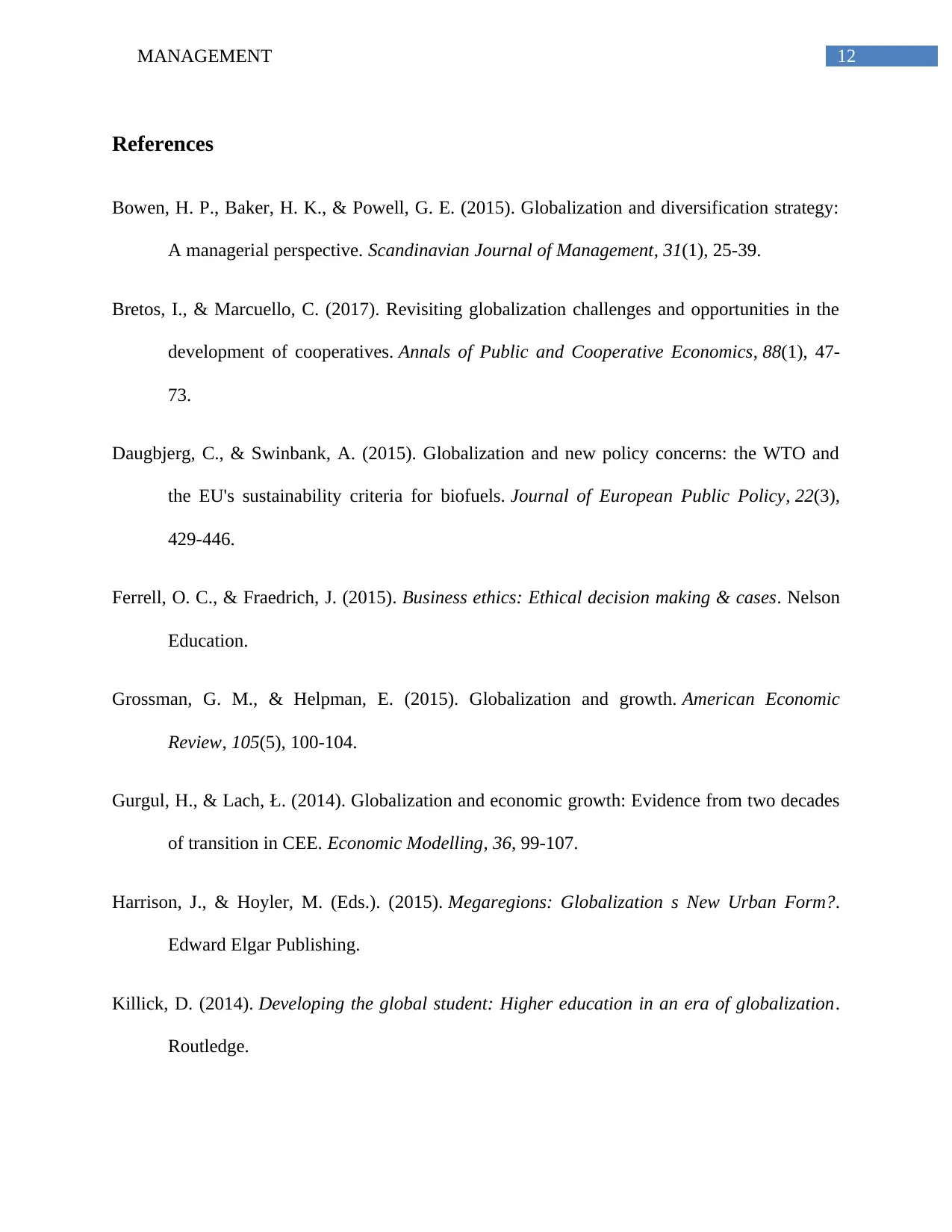
12MANAGEMENT
References
Bowen, H. P., Baker, H. K., & Powell, G. E. (2015). Globalization and diversification strategy:
A managerial perspective. Scandinavian Journal of Management, 31(1), 25-39.
Bretos, I., & Marcuello, C. (2017). Revisiting globalization challenges and opportunities in the
development of cooperatives. Annals of Public and Cooperative Economics, 88(1), 47-
73.
Daugbjerg, C., & Swinbank, A. (2015). Globalization and new policy concerns: the WTO and
the EU's sustainability criteria for biofuels. Journal of European Public Policy, 22(3),
429-446.
Ferrell, O. C., & Fraedrich, J. (2015). Business ethics: Ethical decision making & cases. Nelson
Education.
Grossman, G. M., & Helpman, E. (2015). Globalization and growth. American Economic
Review, 105(5), 100-104.
Gurgul, H., & Lach, Ł. (2014). Globalization and economic growth: Evidence from two decades
of transition in CEE. Economic Modelling, 36, 99-107.
Harrison, J., & Hoyler, M. (Eds.). (2015). Megaregions: Globalization s New Urban Form?.
Edward Elgar Publishing.
Killick, D. (2014). Developing the global student: Higher education in an era of globalization.
Routledge.
References
Bowen, H. P., Baker, H. K., & Powell, G. E. (2015). Globalization and diversification strategy:
A managerial perspective. Scandinavian Journal of Management, 31(1), 25-39.
Bretos, I., & Marcuello, C. (2017). Revisiting globalization challenges and opportunities in the
development of cooperatives. Annals of Public and Cooperative Economics, 88(1), 47-
73.
Daugbjerg, C., & Swinbank, A. (2015). Globalization and new policy concerns: the WTO and
the EU's sustainability criteria for biofuels. Journal of European Public Policy, 22(3),
429-446.
Ferrell, O. C., & Fraedrich, J. (2015). Business ethics: Ethical decision making & cases. Nelson
Education.
Grossman, G. M., & Helpman, E. (2015). Globalization and growth. American Economic
Review, 105(5), 100-104.
Gurgul, H., & Lach, Ł. (2014). Globalization and economic growth: Evidence from two decades
of transition in CEE. Economic Modelling, 36, 99-107.
Harrison, J., & Hoyler, M. (Eds.). (2015). Megaregions: Globalization s New Urban Form?.
Edward Elgar Publishing.
Killick, D. (2014). Developing the global student: Higher education in an era of globalization.
Routledge.
Paraphrase This Document
Need a fresh take? Get an instant paraphrase of this document with our AI Paraphraser
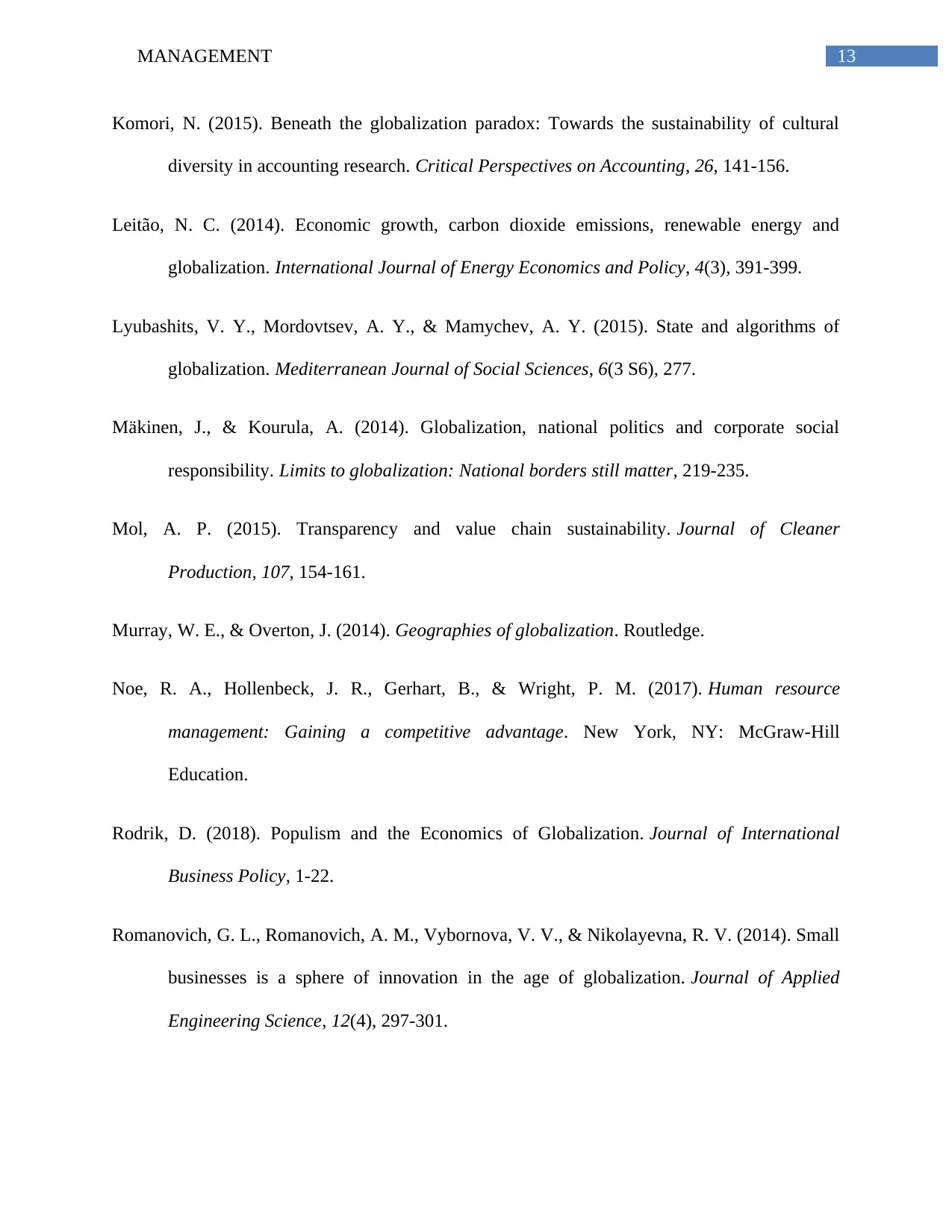
13MANAGEMENT
Komori, N. (2015). Beneath the globalization paradox: Towards the sustainability of cultural
diversity in accounting research. Critical Perspectives on Accounting, 26, 141-156.
Leitão, N. C. (2014). Economic growth, carbon dioxide emissions, renewable energy and
globalization. International Journal of Energy Economics and Policy, 4(3), 391-399.
Lyubashits, V. Y., Mordovtsev, A. Y., & Mamychev, A. Y. (2015). State and algorithms of
globalization. Mediterranean Journal of Social Sciences, 6(3 S6), 277.
Mäkinen, J., & Kourula, A. (2014). Globalization, national politics and corporate social
responsibility. Limits to globalization: National borders still matter, 219-235.
Mol, A. P. (2015). Transparency and value chain sustainability. Journal of Cleaner
Production, 107, 154-161.
Murray, W. E., & Overton, J. (2014). Geographies of globalization. Routledge.
Noe, R. A., Hollenbeck, J. R., Gerhart, B., & Wright, P. M. (2017). Human resource
management: Gaining a competitive advantage. New York, NY: McGraw-Hill
Education.
Rodrik, D. (2018). Populism and the Economics of Globalization. Journal of International
Business Policy, 1-22.
Romanovich, G. L., Romanovich, A. M., Vybornova, V. V., & Nikolayevna, R. V. (2014). Small
businesses is a sphere of innovation in the age of globalization. Journal of Applied
Engineering Science, 12(4), 297-301.
Komori, N. (2015). Beneath the globalization paradox: Towards the sustainability of cultural
diversity in accounting research. Critical Perspectives on Accounting, 26, 141-156.
Leitão, N. C. (2014). Economic growth, carbon dioxide emissions, renewable energy and
globalization. International Journal of Energy Economics and Policy, 4(3), 391-399.
Lyubashits, V. Y., Mordovtsev, A. Y., & Mamychev, A. Y. (2015). State and algorithms of
globalization. Mediterranean Journal of Social Sciences, 6(3 S6), 277.
Mäkinen, J., & Kourula, A. (2014). Globalization, national politics and corporate social
responsibility. Limits to globalization: National borders still matter, 219-235.
Mol, A. P. (2015). Transparency and value chain sustainability. Journal of Cleaner
Production, 107, 154-161.
Murray, W. E., & Overton, J. (2014). Geographies of globalization. Routledge.
Noe, R. A., Hollenbeck, J. R., Gerhart, B., & Wright, P. M. (2017). Human resource
management: Gaining a competitive advantage. New York, NY: McGraw-Hill
Education.
Rodrik, D. (2018). Populism and the Economics of Globalization. Journal of International
Business Policy, 1-22.
Romanovich, G. L., Romanovich, A. M., Vybornova, V. V., & Nikolayevna, R. V. (2014). Small
businesses is a sphere of innovation in the age of globalization. Journal of Applied
Engineering Science, 12(4), 297-301.
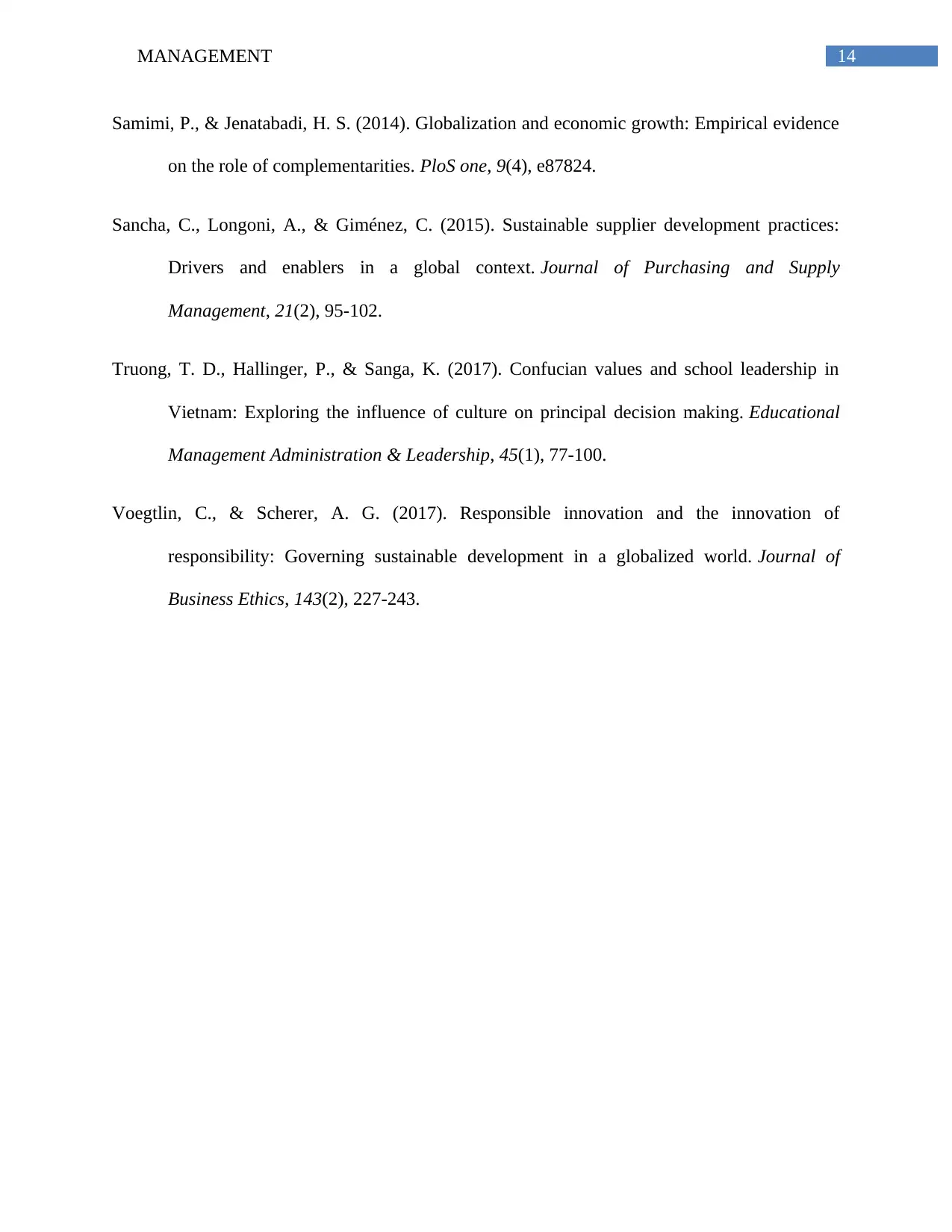
14MANAGEMENT
Samimi, P., & Jenatabadi, H. S. (2014). Globalization and economic growth: Empirical evidence
on the role of complementarities. PloS one, 9(4), e87824.
Sancha, C., Longoni, A., & Giménez, C. (2015). Sustainable supplier development practices:
Drivers and enablers in a global context. Journal of Purchasing and Supply
Management, 21(2), 95-102.
Truong, T. D., Hallinger, P., & Sanga, K. (2017). Confucian values and school leadership in
Vietnam: Exploring the influence of culture on principal decision making. Educational
Management Administration & Leadership, 45(1), 77-100.
Voegtlin, C., & Scherer, A. G. (2017). Responsible innovation and the innovation of
responsibility: Governing sustainable development in a globalized world. Journal of
Business Ethics, 143(2), 227-243.
Samimi, P., & Jenatabadi, H. S. (2014). Globalization and economic growth: Empirical evidence
on the role of complementarities. PloS one, 9(4), e87824.
Sancha, C., Longoni, A., & Giménez, C. (2015). Sustainable supplier development practices:
Drivers and enablers in a global context. Journal of Purchasing and Supply
Management, 21(2), 95-102.
Truong, T. D., Hallinger, P., & Sanga, K. (2017). Confucian values and school leadership in
Vietnam: Exploring the influence of culture on principal decision making. Educational
Management Administration & Leadership, 45(1), 77-100.
Voegtlin, C., & Scherer, A. G. (2017). Responsible innovation and the innovation of
responsibility: Governing sustainable development in a globalized world. Journal of
Business Ethics, 143(2), 227-243.
1 out of 15
Related Documents
Your All-in-One AI-Powered Toolkit for Academic Success.
+13062052269
info@desklib.com
Available 24*7 on WhatsApp / Email
![[object Object]](/_next/static/media/star-bottom.7253800d.svg)
Unlock your academic potential
© 2024 | Zucol Services PVT LTD | All rights reserved.





